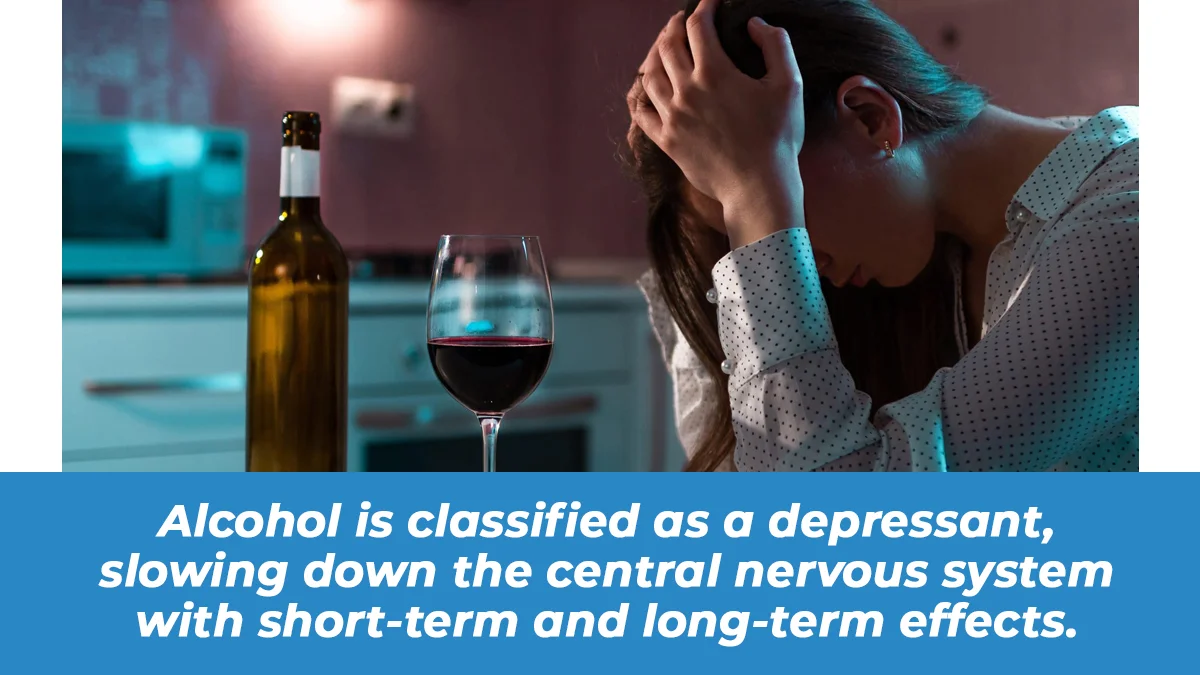
Effectiveness Of Medication-Assisted Treatment
Explore the effectiveness of medication-assisted treatment with The Recovery Team-Newton.

A drug is any substance that alters the way our body functions or behaves. Alcohol, commonly associated with social gatherings and relaxation, fits this definition perfectly. When we consume alcoholic drinks, it affects our central nervous system (CNS), leading to changes in mood, perception, and behavior.
Understanding that alcohol is a drug is the first step toward making informed choices about its use and seeking help when needed. Continue reading to learn the effects of alcohol on the body and mind, the signs and symptoms that one struggling with alcohol addiction may experience, and the available treatment options.
Alcohol is a drug that, when misused, can negatively impact the body and mind and comes with a high potential for addiction. Here is what this article discusses:
The Recovery Team-Newton offers personalized care to those dealing with substance use disorders (SUDs). Contact us at (508) 978-2772 for more information.
A drug is any substance that changes the body’s normal functioning when consumed. This includes prescription drugs, over-the-counter pain relievers, and recreational substances. So, where does alcohol fit into this definition?
Alcohol, widely consumed for social and recreational purposes, is a drug. When you drink beer or wine, alcohol enters your bloodstream and affects your body and brain activity. It acts as a depressant, slowing down your nervous system. This can lead to altered judgment, impaired coordination, and various physical and psychological changes.
What’s important to understand is that alcohol, like other drugs, has the potential for misuse and addiction. When someone relies on alcohol to cope with life’s challenges or can’t control their consumption, it shows physical dependence. It’s crucial to be aware of the impact alcohol can have on one’s life and to seek help if needed.
Alcohol addiction, or alcoholism, is a severe and complex condition affecting millions of Americans. It’s essential to recognize the signs and symptoms of alcohol addiction, as early intervention can make a significant difference in one’s recovery journey.
If you or someone you know is experiencing these symptoms, reaching out to a healthcare professional or addiction specialist is a crucial and courageous step towards a healthier and sober life.
Alcohol is classified as a depressant, which means it slows down the activity of the central nervous system. Consuming this depressant drug can have short- and long-term effects on physical and mental health.
Impaired Judgment: After drinking, people often make poor decisions they wouldn’t make while sober. This can lead to risky behaviors like drunk driving.
Slurred Speech and Lack of Coordination: Alcohol affects motor skills, making people stumble, slur their words, and have trouble performing simple tasks.
Drowsiness: Alcoholic beverages can induce drowsiness or even sleep, which can be dangerous if driving or operating heavy machinery.
Nausea and Vomiting: Overconsumption of alcohol can irritate the stomach lining, causing nausea and sometimes vomiting.
Impaired Memory: Alcohol causes memory impairment, making it difficult to remember events or conversations that occurred while intoxicated.
Addiction: Prolonged alcohol use can lead to addiction, making it challenging to quit despite adverse effects.
Liver Damage: Chronic use of alcohol can cause liver problems, including fatty liver, hepatitis, and cirrhosis.
Heart Problems: Heavy drinking may increase the risk of irregular heartbeat, high blood pressure, cardiomyopathy, and an increased risk of stroke.
Brain Damage: Alcohol can harm brain cells, leading to cognitive impairments and memory problems.
Mental Health Issues: Alcohol misuse is linked to mental disorders like depression, anxiety, and increased risk of suicide.
Cancer: Heavy alcohol use is associated with an elevated risk of certain cancers, including mouth, throat, esophagus, and liver cancer.
Social and Relationship Problems: Excessive drinking can strain relationships, cause financial troubles, and lead to legal issues.
Understanding these negative effects can empower individuals to make informed choices about alcohol consumption and seek help if they develop problematic drinking habits.
Alcohol withdrawal syndrome (AWS) is a set of symptoms that can occur when a person who regularly consumes alcohol suddenly stops or significantly reduces their alcohol intake. It is a challenging and potentially dangerous condition that requires attention and care.
AWS symptoms range from mild to severe.
Anxiety: Feelings of unease, nervousness, and restlessness are common during AWS.
Shaking and Tremors: Uncontrollable shaking, particularly in the hands, is a typical symptom.
Sweating: Profuse sweating, even in cool environments, is a sign of AWS.
Nausea and Vomiting: Individuals may experience stomach upset, leading to nausea and vomiting.
Insomnia: Difficulty falling and staying asleep can be a part of AWS.
Hallucinations: In severe cases, people may see, hear, or feel things that aren’t real.
Seizures: In extreme cases, seizures can occur, which is a medical emergency.
AWS symptoms typically follow a specific timeline:
6-12 Hours: Mild symptoms may start within the first 6-12 hours of abstinence. This includes anxiety, tremors, and an increased heart rate.
12-24 Hours: In the next 12 to 24 hours, symptoms can intensify. Sweating, nausea, and vomiting may become more pronounced.
24-48 Hours: This period is critical, as hallucinations or seizures may occur in severe cases. Delirium tremens (DTs) is an extreme form of AWS that can develop during this time.
48-72 Hours: After the initial 48 to 72 hours, symptoms gradually improve for most individuals. However, some symptoms, like anxiety and sleep disturbances, may persist for several weeks.
Medical supervision and treatment can help manage the AWS, making the process safer and more comfortable for individuals going through withdrawal.
When it comes to treating alcohol addiction, several practical approaches can help individuals on their path to recovery. Here’s a breakdown of some key addiction treatment programs:
Detox is the initial step in alcohol addiction treatment. It involves the process of removing alcohol from the body. This can be challenging because the body has become accustomed to alcohol. Medical supervision during detox is often necessary to manage withdrawal symptoms, ranging from mild discomfort to severe and even life-threatening in some cases.
Inpatient or residential treatment programs require individuals to stay in a treatment facility. This provides a structured and supportive environment to focus solely on recovery. Inpatient rehab is beneficial for those with severe alcohol addiction or those who require a safe and controlled setting.
Outpatient programs offer flexibility as individuals can live at home while attending treatment. This option suits those with milder addiction or individuals transitioning from inpatient care. Outpatient treatment involves therapy and counseling sessions to address the psychological aspects of addiction.
Various behavioral therapies, such as cognitive-behavioral therapy (CBT), motivational enhancement therapy (MET), and Contingency Management (CM), are effective in treating the drinking problem. These therapies help individuals understand the triggers of their addiction, develop coping strategies, and set goals for a sober life.
Medication-assisted treatment (MAT) involves using FDA-approved medications to help individuals with alcohol addiction. Meds like naltrexone, disulfiram, and acamprosate can reduce cravings and withdrawal symptoms. MAT is often combined with behavioral therapies for a comprehensive approach to treatment.
Participating in support groups, such as Alcoholics Anonymous (AA) or SMART Recovery, can allow individuals to connect with others who have experienced similar challenges. Support groups offer a sense of community, encouragement, and the chance to share experiences and strategies for maintaining sobriety.
No matter the treatment path chosen, the key is seeking help and committing to a plan that works best for the individual. Alcoholism is a treatable condition; recovery is possible with the right approach and support.
Yes, a person can become addicted to alcohol, just like they can to other drugs. Alcohol addiction, often called alcohol use disorder (AUD), involves a strong dependence on alcohol, leading to physical and mental health problems. It’s essential to seek help if you or someone you know is struggling with alcohol addiction.
The treatment process for alcohol addiction shares similarities with other drug addictions. Both involve detox, counseling, therapy, and support. However, specific approaches can vary based on the substance, individual needs, and addiction severity.
Yes, alcohol is a drug. It’s a psychoactive substance that can affect the mind and body when consumed. It’s essential to recognize that alcohol falls into the category of drugs due to its impact on our nervous system and behavior.
If you’re struggling with alcohol addiction, don’t worry. You’re stronger than you think, and there’s help available. The Recovery Team-Newton is here to lend a hand.
Our outpatient treatment program lets you tackle alcohol addiction without putting your life on hold. We offer medication-assisted treatment (MAT) to help reduce cravings and withdrawal symptoms, making your path to recovery more manageable.
We understand that addiction and mental health issues can co-occur. Our medical professionals provide dual diagnosis support, ensuring a comprehensive and personalized approach to your recovery.
Don’t wait any longer. Contact us at (508) 978-2772 today for more information.

Explore the effectiveness of medication-assisted treatment with The Recovery Team-Newton.

Explore the examples of dual diagnosis and its treatment plans for better outcomes with The Recovery Team-Newton.

Explore how long drug rehab programs are with the complete guide from The Recovery Team-Newton.